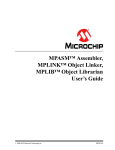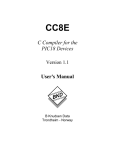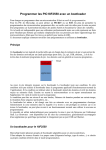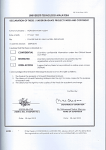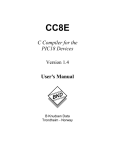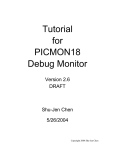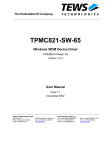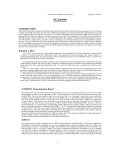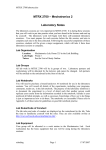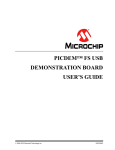Download MPASM Assembler
Transcript
MPASM Assembler
with MPLINK and MPLIB
Linker and Librarian
David Rye :: MTRX 3700
MPASM Assembler :: Slide 1 of 78
What is
<A>
?
Assembly Language
Instructions for a µP written in the form of mnemonics
Confusingly also referred to as “assembler”, as in “assembler
code”, or to “… program in assembler …”
Assembler
A program that translates from an assembly language to machine
instructions
A Cross Assembler is a program that runs on one type of processor
(e.g. x86) and produces machine instructions for another type (PIC)
Assemble
Translate to machine instructions (an assembly language is
assembled, a HLL is compiled or interpreted)
Assembly
The process of translation
David Rye :: MTRX 3700
MPASM Assembler :: Slide 2 of 78
What is an Assembler ?
At least: a translator from mnemonics to binary instructions
ADLW
h’AA’ 00001111 10101010
Invariably, an assembler:
Has a set of directives that control assembler processing
Calculates relative addresses from instruction labels and variable names
Most assemblers are macro assemblers
Perform macro substitution, expansion and calculation at assembly time
Macro language allows assembly language programming at a higher level of
abstraction
local i = 0
while i < 8
<something>
i += 1
endw
; establish local index variable and initialize
; do <something> 8 times
; increment loop counter
; break after eight loops
Structured assembler – see Peatman for example and source code
Very simple form of compiler
Allows control structures (e.g. if-then-else) that are active at run time
David Rye :: MTRX 3700
MPASM Assembler :: Slide 3 of 78
MPASM Assembler Files
Input to Assembler:
.asm Assembly language source file
Output from Assembler:
.lst Assembler listing file
.err Assembler error messages
.o
Relocatable object file
David Rye :: MTRX 3700
MPASM Assembler :: Slide 4 of 78
Assembler Listing File (.lst) Format
MPASM 5.57
LOC OBJECT CODE
VALUE
0000000B
000000
000000 0E0A
000002 6E0B
000004 EF?? F???
000124 EF?? F???
David Rye :: MTRX 3700
SAMPLE.ASM
8-25-2014
12:37:00
LINE SOURCE TEXT
00001 ; Sample MPASM Source Code.
00002
00003
list p=18F452
00004 Dest
equ
0x0B
00005
00006
org
0x0000
00007 Start:
00008
movlw
0x0A
00009
movwf
Dest
00010
goto
Start
00011
00012
org
0x0124
00013
goto
Start
00014
00015
end
MPASM Assembler :: Slide 5 of 78
Assembler Listing File (.lst) Format
MPASM 5.57
SAMPLE.ASM
SYMBOL TABLE
LABEL
12:37:00
VALUE
Dest
Start
__18F452
Errors
:
Warnings :
Messages :
8-25-2014
0000000B
00000000
00000001
0
0 reported,
0 reported,
0 suppressed
0 suppressed
defined because we are building
for the PIC18F452 processor
David Rye :: MTRX 3700
MPASM Assembler :: Slide 6 of 78
What is
<L>
?
Linker
Program that translates one or more relocatable object
modules into executable instructions with absolute
addresses
Library
Collection of relocatable object modules
Librarian
Program that creates and manages a library
Add, remove, replace, list object modules
David Rye :: MTRX 3700
MPASM Assembler :: Slide 7 of 78
MPLINK Linker Files
Input to Linker:
.o
Relocatable object file – or –
.lib Relocatable object code in library file
Output from Linker
.hex Absolute machine code, Intel Hex format
.cof Absolute machine code, in Common Object
File Format – contains executable code and
symbol table
.map Load map file – shows where program and data objects
are placed in memory
David Rye :: MTRX 3700
MPASM Assembler :: Slide 8 of 78
Workflow – Assembler and Linker
Assemble one or more assembly language Source Files
xxxx.asm to Relocatable Object Files using MPASM
Link relocatable object files with linker MPLINK to
form absolute executable file
Even one file must be linked!
(to calculate absolute
addresses)
David Rye :: MTRX 3700
MPASM Assembler :: Slide 9 of 78
MPLAB X File Structure:
Assembler and Linker Outputs
\---Example.X
|
Source files: *.asm, *.inc
|
Makefile
|
(Assembler Output – safe to delete)
+---build
|
\---default
|
+---debug
|
|
Listing files *.lst
|
|
Error files *.err
|
|
Relocatable Object files *.o
|
|
|
\---production
|
|
|
|
|
|
|
|
\---nbproject
(Project Configuration – don’t edit!)
|
configurations.xml
|
Makefile-default.mk
|
Makefile-genesis.properties
Listing files *.lst
Error files *.err
Relocatable Object files *.o
+---dist
(Linker Output – safe to delete)
|
\---default
|
+---debug
|
|
Example.X.debug.cof
|
|
Example.X.debug.hex
|
|
Example.X.debug.map
|
|
|
|
|
|
|
\---production
Example.X.production.cof
Example.X.production.hex
Example.X.production.map
David Rye :: MTRX 3700
|
Makefile-impl.mk
|
Makefile-local-default.mk
|
Makefile-variables.mk
|
Package-default.bash
|
project.properties
|
project.xml
|
\---private
configurations.xml
private.properties
MPASM Assembler :: Slide 10 of 78
Workflow – Librarian
Librarian MPLIB can be used to
create and manage libraries of
relocatable object code.
For example:
clib.lib
p18f452.lib
myLib.lib
David Rye :: MTRX 3700
MPASM Assembler :: Slide 11 of 78
The Assembler: MPASM
David Rye :: MTRX 3700
MPASM Assembler :: Slide 12 of 78
The Assembler: MPASM
Universal macro assembler for all PIC devices
Device capabilities and mnemonics (of course)
change from one device to another…
Choice of three interfaces
Command-line (DOS shell) interface
Stand-alone MS-Windows application
Integrated with Microchip’s MPLAB IDE
An integral part of MPLAB X IDE
David Rye :: MTRX 3700
MPASM Assembler :: Slide 13 of 78
MPLAB X Help Files
MPLAB X is Microchip’s (free) IDE
MPLAB X v. 3.05 available from UoS website
The on-line help files in MPLAB X are good
Go to Help Contents MPASMX Toolsuite
David Rye :: MTRX 3700
MPASM Assembler :: Slide 14 of 78
Assembly Language Syntax
Rules for assembly language source code
David Rye :: MTRX 3700
MPASM Assembler :: Slide 15 of 78
Syntax: Assembly Language File
Each line of code may contain zero or more
Labels
Mnemonics
Operands
Comments
Maximum line length is 255 characters
Whitespace is not significant
Wait:
btfss
David Rye :: MTRX 3700
PIR1, ADIF
; wait for A/D conversion done
MPASM Assembler :: Slide 16 of 78
Syntax: Assembly Language File
Labels
Start in column 1 (corollary: anything starting in column 1 is a label)
Are case-sensitive by default
Must begin with alphabetic character or underscore (_)
Can be 32 characters long
Can be followed by a colon (:) or whitespace
Mnemonics (e.g. movlw)
Must not start in column 1
Must be separated from label(s) by colon (:) or whitespace
Operands
Must be separated from mnemonics by whitespace
Multiple operands must be separated by a comma (,)
Comments
Can start anywhere
Everything from a semicolon (;) to the end-of-line is a comment
David Rye :: MTRX 3700
MPASM Assembler :: Slide 17 of 78
Syntax: Assembly Language File
Radixes (Bases)
Hexadecimal:
Decimal
Octal:
Binary:
H’A3’ or 0xA3
D’163’
O’243’
B’10100011’
(default)
Note – all the same number,
but different radixes!
Default radix is Hexadecimal
There is no floating point type
ASCII Character: ’C’ or A’C’
ASCII String:
“A String”
Note! A string is not Null-terminated unless you add the terminator!
David Rye :: MTRX 3700
MPASM Assembler :: Slide 18 of 78
Assembler Directives
Directives =
Instructions in the source code that tell the
assembler how to assemble a source file
David Rye :: MTRX 3700
MPASM Assembler :: Slide 19 of 78
Assembler Directives
Assembler directives are placed in the assembly
language source file, and tell the assembler how to
assemble the source.
They are not active at run time
They are not case sensitive
There are many arithmetic and logic operators that
can be used to construct directive expressions
For example: +, -, *, /, <<, ==, <=, ~, !, &, ||, etc…
See precedence table in MPASM User’s Guide
David Rye :: MTRX 3700
MPASM Assembler :: Slide 20 of 78
Assembler Directives
There are six types of assembler directives, for
1.
2.
3.
4.
5.
6.
Assembler Control
Conditional Assembly
Data Definition
Listing Control
Object File Control
Macro Definition
David Rye :: MTRX 3700
MPASM Assembler :: Slide 21 of 78
1. Assembler Control Directives
Defining which processor we are building for
Defining assembler error reporting level
Defining symbolic names
Including files
David Rye :: MTRX 3700
MPASM Assembler :: Slide 22 of 78
Assembler Control – Configuration
PROCESSOR: Defines the build target processor
processor <processor>
processor 18f452
RADIX: Specify default radix (base)
radix <default_radix>
radix hex
Options are hex, dec, oct
Radix defaults to hex if not specified
ERRORLEVEL: Set diagnostic message level
errorlevel 0|1|2|<+-><msg_number>
errorlevel 0
0 is show all errors and warnings, 2 is show none
Important hint!! Use errorlevel 0
-<msg_number> suppresses a single message
David Rye :: MTRX 3700
MPASM Assembler :: Slide 23 of 78
Assembler Control – Symbols
EQU: Defines a symbolic label for a constant
<label> equ <expr>
expr is a number
See examples in p18f452.inc
HEIGHT
DEPTH
equ
equ
D’17’
HEIGHT * 2
Length
Area
Length
set
set
set
2
HEIGHT * Length
Length + 1
SET: Defines a symbolic label for a variable
<label> set <expr>
Same as EQU except that value of <label> can
be redefined with another SET
David Rye :: MTRX 3700
MPASM Assembler :: Slide 24 of 78
Assembler Control – Symbols
CONSTANT: Declare symbol constant
constant <label> = <expr>
[, <label> = <expr>]
A constant must be initialised when defined,
and cannot be changed
constant BuffLen = D’512’
constant MASK = ~(0xAA)
flags &= MASK
VARIABLE: Declare symbol variable
variable <label> [= <expr>]
[, <label> [= <expr>]]
variable RecLen = D’64’
variable Memory = RecLen * BuffLen
A variable does not need to be initialised when
defined (as in SET), and value can be changed
subsequently
Variable value must be formed before being used
as an operand
David Rye :: MTRX 3700
MPASM Assembler :: Slide 25 of 78
Assembler Control – Placing Code
ORG: Set absolute program origin
<label> org <expr>
Sets the value of the assembler’s location counter
For PIC18 <expr> must be an even number
The location counter value at assembly time
is equivalent to the PC value at run time
Cannot be used when generating a
relocatable object file
Use CODE, UDATA, UDATA_ACS, IDATA
directives instead (see later)
David Rye :: MTRX 3700
org
0x000008
goto HighISR
; HighISR replaced by address
HighISR:
; High priority ISR goes here
…
RETFIE
MPASM Assembler :: Slide 26 of 78
Assembler Control – Defines
#DEFINE:
Define a text substitution symbol
#UNDEFINE: Delete a text substitution symbol
#define
MAX_INT
#define
DEBUG
D’65535’
#define <symbol> [<string>]
#undefine <symbol>
Same mechanism as in ANSI C
<string> will be substituted for <name> from
the point where #defined
#IFDEF: Execute if symbol is defined
#IFNDEF: Execute if symbol is not defined
#ENDIF: Terminates conditional block
ifdef <symbol>
<something>
endif
David Rye :: MTRX 3700
#ifdef DEBUG
constant BuffLen
variable RecLen
#else
constant BuffLen
variable RecLen
#endif
= 8
= 4
= D’512’
= D’64’
#undefine DEBUG
MPASM Assembler :: Slide 27 of 78
Assembler Control – Include
INCLUDE: Literally include a file at this point
#include <path\filename>
#include “path\filename”
#include path\filename
Similar to ANSI C
No difference in behaviour between the
forms <file> and “file” and file
Search path order is current directory; source
file directory; MPASM executable directory
David Rye :: MTRX 3700
; get register symbols, etc
#include p18f452.inc
; define configuration bits
#include configReg.inc
MPASM Assembler :: Slide 28 of 78
The low, high and upper Operators
LOW:
Return the low byte (bits <7:0>)
of a multi-byte value
HIGH:
Return the high byte (bits <15:8>)
of a multi-byte value
UPPER: Return the upper byte (bits <21:16>)
of a multi-byte value
David Rye :: MTRX 3700
table:
data “I’m a ”
data “beatles ”
data “eater”
; Load TBLPTR with the address of ‘I’
movlw UPPER table
movwf TBLPTRU
movlw HIGH table
movwf TBLPTRH
movlw LOW table
movwf TBLPTRL
MPASM Assembler :: Slide 29 of 78
The banksel Directive
BANKSEL: Generate bank selecting code
(movlb) that selects the correct
bank for a variable in any bank of
RAM
banksel Var1
movwf Var1, F, BANKED
; Select correct
; bank for Var1
; Write to Var1
banksel label
David Rye :: MTRX 3700
MPASM Assembler :: Slide 30 of 78
Assembler Control – Termination
END: End of assembly language program
end
Every program must finish with an end directive
Everything after end is ignored
David Rye :: MTRX 3700
MPASM Assembler :: Slide 31 of 78
2. Conditional Assembly Directives
Permit sections of code to be conditionally
assembled
These are active only during assembly – they are
not active at run time
Similar to C language preprocessor directives – e.g.
#ifdef TESTING
// some C code here
#endif
David Rye :: MTRX 3700
MPASM Assembler :: Slide 32 of 78
Conditional Assembly – if-else-endif
We have already seen IFDEF, IFNDEF
IF:
Begin conditionally assembled block
ELSE: Begin alternative block to IF
ENDIF: End conditional assembly block
#if <expr>
<assembly_code>
[#else
<alternative_assembly_code> ]
#endif
if rate < 50
INCF speed, F
else
DECF speed, F
endif
<expr> is evaluated – non-zero is interpreted
as logically TRUE
David Rye :: MTRX 3700
MPASM Assembler :: Slide 33 of 78
Conditional Assembly – While
WHILE: Loop while <expr> is TRUE
ENDW: End of a WHILE loop
while <expr>
<assembly_code>
endw
<expr> is evaluated and a non-zero value is
interpreted as logically TRUE
<assembly_code> cannot exceed 100 lines
Cannot loop more than 256 times
Active at assembly time
David Rye :: MTRX 3700
MPASM Assembler :: Slide 34 of 78
The Five ENDs
Don’t confuse the various ENDx directives!!
END:
End of the assembly program
any program end
ENDIF:
End of a conditional block
if endif
ENDW:
End of a while loop
while endw
ENDM:
End of a macro definition
macro endm
ENDC:
End an automatic constant block
(cblock defines a list of named constants)
cblock endc
David Rye :: MTRX 3700
MPASM Assembler :: Slide 35 of 78
3. Data Definition Directives
Control memory allocation and symbol definition
This is how to define named “variables” in RAM and
named constant values in FLASH
David Rye :: MTRX 3700
MPASM Assembler :: Slide 36 of 78
Data Definition – Integers
DB: Declare data of one byte (in ROM or RAM)
DW: Declare data of one word (in ROM or RAM)
DE: Declare EEPROM data of one byte
db <expr> [,<expr>,...,<expr>]
dw <expr> [,<expr>,...,<expr>]
de <expr> [,<expr>,...,<expr>]
All reserve storage in program or data memory and
initialize the memory location(s)
db packs 8-bit values into 16-bit memory.
dw behaves like db for PIC18 devices
dw packs words into data memory in lowbyte/high-byte order
See the idata and code_pack directives
de places 8-bit values into EEPROM
David Rye :: MTRX 3700
; Absolute code in FLASH
org
0x2000
errorFlags: db B’10100011’
highLimit:
dw D’350’
aString:
db ‘Hello Room!’
; Relocatable code in RAM
udata_acs
accessVar: db 0x55
udata 0x300
myVariable: db D’99’
MPASM Assembler :: Slide 37 of 78
Data Definition – General
DATA: Create numeric and text data
data <expr>,[,<expr>,...,<expr>]
data "<text_string>“
[,"<text_string>",...]
General data definition - places numeric or
text data into Program Memory
Single characters placed in low byte of word
Strings packed 2 characters per 16-bit word, first
character in LSB
Can be used to declare values in IDATA
data
‘C’
data
“Sharp”
Numbers:
data
1, 2, 7
; one character
; string
; some numbers
FILL: Fill memory block with value
fill <expr>, count
If bracketed by parentheses, <expr> can be a
(16-bit long) assembly language instruction
David Rye :: MTRX 3700
fill
fill
0x5555, D’10’
(nop), NEXT_BLOCK-$
MPASM Assembler :: Slide 38 of 78
Data Definition – Un-initialised Memory
RES: Reserve memory
res
<mem_units>
Reserve a number of bytes
of memory
Do not initialize the memory
In absolute code, Program Memory will be
reserved
In relocatable code, memory can be either in
in Program Memory or Data Memory
See code directive (Program Memory) and
udata directive (Data Memory)
David Rye :: MTRX 3700
; Absolute code
org
0x2000
res
0x20
; 32 bytes
; Relocatable code
Globals:
udata
temp
res
1
time
res
2
; 2 bytes
MPASM Assembler :: Slide 39 of 78
Data Definition – μC Configuration
PROCESSOR: Set processor type
processor <processsor_type>
PROCESSOR 18f452
CONFIG: Set processor configuration bits
config <bit>=<value>
__config is deprecated
Sets the configuration bits
Processor must previously have been declared
Best practice: use to over-ride MPLAB X config
bit settings. See configReg.inc on server
See usage and definitions in p18f452.inc
#include configReg.inc
; or
; Configuration Register 1H
; Oscillator switch disabled,
; EC oscillator.
CONFIG
OSCS=OFF, OSC=EC
;
; etc, ...
__IDLOCS: Set values of processor ID locations
Similar to __CONFIG
David Rye :: MTRX 3700
MPASM Assembler :: Slide 40 of 78
Data Definition – RAM Configuration
_ _ MAXRAM: Specify maximum RAM address
__maxram <expr>
Specifies the highest address of physical RAM
processor
__MAXRAM
18F452
H'FFF'
; Unimplemented banks
__BADRAM
H'600'-H'F7F'
_ _BADRAM: Specify invalid RAM addresses
__badram <expr>
Can have more than one __badram directive
__maxram and __badram together allow strict
RAM address checking
David Rye :: MTRX 3700
; Unimplemented SFRs
__BADRAM
H'F85'-H'F88'
__BADRAM
H'F8E'-H'F91'
__BADRAM
H'F97'-H'F9C'
__BADRAM
H'FA3'-H'FA5'
__BADRAM
H'FAA'
__BADRAM
H'FB4'-H'FB9'
MPASM Assembler :: Slide 41 of 78
4. Listing Control Directives
Directives to control the content and format of the
assembler listing file xxxxx.lst
David Rye :: MTRX 3700
MPASM Assembler :: Slide 42 of 78
4. Listing Control Directives
TITLE:
Specify Program Title for listing
SUBTITLE: Specify Program Subtitle for listing
title “<title_text>”
subtitle “<subtitle_text>”
If defined, title and subtitle print on each
page of the listing
title “Code Release 2006-03-16”
; Stuff here
page
subtitle “Memory Diagnostics”
; Memory Diagnostic code here
SPACE: Insert Blank Lines
PAGE: Insert Page Eject
space <expr>
page
space inserts a number of blank lines
into the listing file
page inserts a new page character
into the listing file
David Rye :: MTRX 3700
MPASM Assembler :: Slide 43 of 78
Listing Control Directives
LIST:
Turn on listing, with options
NOLIST: Turn off listing
list [<option1>[, <option2>
[, ...] ] ]
nolist
list, with no options, turns listing on
Options (14 of them) control various
listing settings – see Assembler Manual / help
nolist turns off listing
; suppress listing of symbols, etc
nolist
include p18f452.inc
; turn listing back on
list
EXPAND:
Expand Macros in Listing
NOEXPAND: Don’t Expand Macros in Listing
expand or noexpand
Expand or suppress expansion of all macros
in listing file
David Rye :: MTRX 3700
MPASM Assembler :: Slide 44 of 78
Listing Control Directives
if size > MAX_INT
ERROR: Issue a user-defined error
error "16-bit value exceeded"
message
MESSG: Create user-defined message endif
messg “message_text”
error “error_text”
#include p18f452.inc
Both print user-defined messages
variable baudrate
baudrate set D'5600' ; required baud rate
if (baudrate!=D'1200')&&(baudrate!=D'2400')&&
(baudrate!=D'4800')&&(baudrate!=D'9600')&&
(baudrate!=D'19200')
error "Selected baud rate is not supported"
messg "only baud rates 1200,2400,4800, "&&
"9600 & 19200 Hz are supported"
endif
David Rye :: MTRX 3700
MPASM Assembler :: Slide 45 of 78
Relocatable Object Files
David Rye :: MTRX 3700
MPASM Assembler :: Slide 46 of 78
Relocatable Object Files
Assembled (or compiled) object files xxxxx.o with
no associated absolute load addresses
Required for
Building pre-assembled object libraries with MPLIB
Linking assembly language and C language modules –
Compiler output will be relocatable
Specify the segment (or section) for placement of
each part of the linker output, rather than absolute
addresses
David Rye :: MTRX 3700
MPASM Assembler :: Slide 47 of 78
5. Directives for Relocatable Object Code
So we need directives to work with
Projects with multiple assembly language files
Placing information into Program or Data Memory
Relocatable Object Files
Here they are…
David Rye :: MTRX 3700
MPASM Assembler :: Slide 48 of 78
Directives for Object File Imports/Exports
EXTERN: Declare an externally defined label
extern <label> [, <label> . ..]
Use when using/generating relocatable object file
Similar to C/C++ extern – declare a label (name
of subroutine, etc) that is declared outside the
file being assembled
Resolved by the linker
GLOBAL: Export a label to the linker
global <label> [,<label>]
Use when using/generating relocatable object file
Declare a label (name of subroutine, etc) to
make it visible outside the file being assembled
Resolved by the linker
David Rye :: MTRX 3700
; Subroutine is called from one
; assembly language file
extern Subroutine
call Subroutine
; Subroutine is defined in
; a different file
global Subroutine
Subroutine: code
; body of subroutine
return
MPASM Assembler :: Slide 49 of 78
Relocatable Program Memory Segments
Location of executable code (or constant values) in ROM
Absolute: Use an org directive to locate code at an
absolute address
Relocatable: Declare a code segment (or a
code_pack segment) and allow the linker to
calculate the address
Valid address ranges specified in a Linker Script File
David Rye :: MTRX 3700
MPASM Assembler :: Slide 50 of 78
Directives for Object Code Memory Segments
CODE: Begin an executable code segment
(or constants stored in program memory)
; Executable code
RST
code 0x00
goto start
[<label>] code [<ROM_addr>]
If <label> unspecified, defaults to .code
Starting address initialised to <ROM_addr>,
or at link time if no address specified
CODE_PACK: Begin packed code segment
(constants stored efficiently in program memory)
[<label>] code_pack[<ROM_addr>]
Used to place constant data (one byte per byte)
into FLASH memory (use db)
Use with de to place constant data into EEPROM
David Rye :: MTRX 3700
; Padded data – append padding
; byte of 0 to odd number or bytes
padded: code
DB 1, 2, 3
DB 4, 5
; Packed data – no padding bytes
; appended
packed: code_pack 0x1F0
DB 1, 2, 3
DB 4, 5
MPASM Assembler :: Slide 51 of 78
Relocatable Data Memory Segments
Data (variables) can be assigned to 1 of 5 segments:
udata
udata_acs
udata_ovr
idata
idata _acs
Each Un-initialised - use the
RES directive
Initialised (at least potentially…) – use
DB, DW, etc. directives
The linker will place each of these in RAM, at
locations specified by a linker file, xxx.lkr
If a linker file is not added to the project, the default
generic linker file 18f452_g.lkr is used
David Rye :: MTRX 3700
MPASM Assembler :: Slide 52 of 78
Un-initialised Data Memory Segments
Data stored in any of these segments is not
initialised
Can only be accessed through:
Labels (variable names) declared in the segment
Indirect addressing
udata – Un-initialised data, placed in RAM >= 0x80
udata_acs – access data, placed in Access RAM
udata_ovr – overlaid data
Used for variables that can be placed at the same addresses
because they exist at different, non-overlapping times
David Rye :: MTRX 3700
MPASM Assembler :: Slide 53 of 78
Directives for Object Code Memory Segments
UDATA: Begin un-initialised data segment
[<label>] udata [<RAM_addr>]
If <label> unspecified, defaults to .udata
Declares a segment of Un-initialised data
Starting address initialised to <RAM_addr>,
or at link time if no address specified
UDATA_ACS: Begin object file un-initialised data
segment in Access RAM
[<label>] udata_acs [<RAM_addr>]
If <label> unspecified, defaults to .udata_acs
Declares a segment of Un-initialised data in
Access RAM
Starting address initialised to <RAM_addr>,
or at link time if no address specified
David Rye :: MTRX 3700
; Relocatable code – variable
; in (banked) RAM
udata
aVariable: res 1
; Relocatable code – variable
; in access RAM
udata_acs
accessVar: res 1
MPASM Assembler :: Slide 54 of 78
Directives for Object Code Memory Segments
UDATA_OVR: Begin object file un-initialised data
overlay segment
[<label>] udata_ovr [<RAM_addr>]
If <label> unspecified, defaults to .udata_ovr
Un-initialised data in this segment is overlayed
with all other data in udata_ovr segments of
the same name <label>
David Rye :: MTRX 3700
MPASM Assembler :: Slide 55 of 78
idata – Initialised Data Memory Segment
Data elements in idata or idata_acs can be initialised – that
is, given initial values
Use the DB, DW, or DATA directives to
a) reserve memory and
b) specify initial values
Question: idata is a RAM segment (volatile), so
where do the initial values come from?
David Rye :: MTRX 3700
MPASM Assembler :: Slide 56 of 78
Directives for Object Code Memory Segments
IDATA: Begin an object file initialised data segment
[<label>] idata [<RAM_addr>]
Use when generating relocatable object file
If <label> unspecified, defaults to .idata
Location Counter initialised to <RAM_addr>,
or at link time if no address specified
Linker generates look-up table entry in ROM for
each entry. User must add initialisation code to
copy values from ROM to RAM using the
“_cinit table”. See the file IDATA.ASM for a
good example
David Rye :: MTRX 3700
initialisedGlobals:
idata
LimitL: dw 0
LimitH: dw D’300’
Gain:
dw D’5’
Flags
db 0
String db “Y-Axis”,0
MPASM Assembler :: Slide 57 of 78
idata – Initialised Data Memory Segment
The linker generates and populates a table (the “_cinit table”)
in ROM that contains an entry for each initialised data element
Table begins with a 16-bit number num_init that stores the
number of initialised data element
Each table entry has three 32-bit integers that store
The from address in ROM (FLASH)
The to address in idata or idata_acs RAM
The size in bytes of the data element
User code must copy each from byte to the corresponding to at
run-time, but before the main code (assembler or C) executes
See the examples in IDATA.asm and c18i.c
David Rye :: MTRX 3700
MPASM Assembler :: Slide 58 of 78
Example – Data Segments
From the .lst file generated by MPASM
Segment type
000000
000001
000000 52
63
000007 D2
000000 A5
00005
00006
00007
00008
00009
75 62 72 69 00010
00
04
00011
00012
00013
00014
Uninitialised UDATA
LimitL RES 1
LimitH RES 1
Initialised IDATA
String DB "Rubric", 0
; 0x52 75 62 72 69 63 00
Gain
DW D'1234'
; 1234 = 0x04D2
Access
Flags
IDATA_ACS
db B'10100101'
; 0xA5
Name of this segment
David Rye :: MTRX 3700
MPASM Assembler :: Slide 59 of 78
Example – Data Segments
From the .map file generated by MPLINK
Section .cinit contains the _cinit table
.cinit section starts at 0x000008
Section Info
Section
--------.org_0
.cinit
Initialised_i
Access_i
.org_1
Access
Initialised
Uninitialised
Type
--------code
romdata
romdata
romdata
code
idata
idata
udata
Address
--------0x000000
0x000008
0x000022
0x00002b
0x000124
0x000000
0x000080
0x000089
Location Size(Bytes)
--------- --------program
0x000008
program
0x00001a
program
0x000009
program
0x000001
program
0x000004
data
0x000001
data
0x000009
data
0x000002
Section Initialised_i contains the initial values of initialised variables
Section Initialised contains the initialised variables
David Rye :: MTRX 3700
MPASM Assembler :: Slide 60 of 78
Example – Data Segments
Contents of Program Memory
movlw
0x0A
movwf
Addr
0000
0010
0020
00
0E0A
0000
0000
start of _cinit table
DEST
goto START
02
04
06
6E0B EF00 F000
0001 0000 0022
7552 7262 6369
u R
r b
c i
initial value of Gain = 0x04D2
08
0002
0000
D200
/0
0A
002B
0080
A504
0C
0000
0000
FFFF
0E
0000
0009
FFFF
...n.... ..+.....
......". ........
..Rubric ........
initial value of Flags = 0xA5
_cinit Table
0002
0000 002B
0000 0022
0000 0000
0000 0080
David Rye :: MTRX 3700
0000 0001
0000 0009
num_init = 2
copy 1 byte from 0x00002B (ROM)to 0x000 (RAM)
copy 9 bytes from 0x000022 (ROM)to 0x080 (RAM)
MPASM Assembler :: Slide 61 of 78
MPASM Macro Language
A simple form of preprocessor that allows
for limited higher-level abstraction
David Rye :: MTRX 3700
MPASM Assembler :: Slide 62 of 78
Macros
Allow “functions” with “arguments”
Macro processor can function like a simple compiler
In reality, macro processor is just doing
substitutions – “macro expansion”
David Rye :: MTRX 3700
MPASM Assembler :: Slide 63 of 78
Macro Syntax
Syntax is
<label> macro [<arg1>, <arg2>, ..., <argn>]
<statements>
endm
; ends macro definition
<label> is the symbolic name of the macro
Zero or more arguments
Values assigned to arguments when macro is invoked are
substituted for the argument names in the macro body
Body <statements> may contain
Assembly language mnemonics
Assembler directives
Macro directives macro, local, exitm, endm, expand / noexpand
David Rye :: MTRX 3700
MPASM Assembler :: Slide 64 of 78
6. Directives for Macro Definition
Control execution and data allocation within macros
macro - Declare macro Definition
exitm - Exit from a macro (stop expansion; exit to the endm)
endm - End a macro definition
expand - Expand macro listing
noexpand - Turn off macro expansion
local - Declare a local macro variable
David Rye :: MTRX 3700
MPASM Assembler :: Slide 65 of 78
Macro Definitions
MACRO: Declare a macro definition
ENDM: End a macro definition
<label> macro [<arg>,...,<arg>]
<statements>
endm
LOCAL: Declare local macro variable
local <label> [,<label>]
Declared inside a macro – local scope
len
size
equ 10
equ 20
m_buffer:
macro
local
len
set
label res
len
set
endm
size
len, label
size
len
len - size
EXITM: Exit from a macro
exitm
Forces immediate exit from macro
during assembly
David Rye :: MTRX 3700
MPASM Assembler :: Slide 66 of 78
Example – Macro Definition
Macro definition is
#include “p18f452.inc”
;
; Compare register aReg to a constant aConst and
; jump to aDest if register value >= constant.
;
mCmpJge:
macro aReg, aConstant, aDestination
movlw
aConstant
subwf
aReg, W
btfsc
status, carry
goto
aDestination
endm
David Rye :: MTRX 3700
MPASM Assembler :: Slide 67 of 78
Example – Macro Invocation
When invoked (“called”) by:
mCmpJge switchVal, maxSwitch, switchOn
the macro mCmpJge will produce (expand to):
movlw
subwf
btfsc
goto
David Rye :: MTRX 3700
maxSwitch
switchVal, W
status, carry
switchOn
MPASM Assembler :: Slide 68 of 78
The Linker (MPLINK)
David Rye :: MTRX 3700
MPASM Assembler :: Slide 69 of 78
The Linker – MPLINK
Locates code and data – Given relocatable object
code and linker script, places code and data in
memory
Resolves addresses – calculates absolute addresses
of external object modules
Generates an executable – a .HEX file of specified
format
Configures (software) stack size and location (in C)
Identifies address conflicts
Produces symbolic debug information – allows the
use of symbols for variables, functions, rather than
addresses.
David Rye :: MTRX 3700
MPASM Assembler :: Slide 70 of 78
MPLINK Inputs
.o
– Relocatable object files
.lib – Collections of relocatable object files
Usually grouped in a modular fashion
Only used modules are linked into the executable
.lkr – Linker script files tell the linker
What files to link
Range of valid memory addresses for a particular target
David Rye :: MTRX 3700
MPASM Assembler :: Slide 71 of 78
MPLINK Outputs
.hex – Binary executable file
Intel HEX format / 8-bit split format / 32-bit HEX format
No debug information
.cof – Binary executable file in COFF
(Common Object File Format
Also contains symbolic debug information
.map – Load map, showing memory use after linking
Identify absolute addresses of globals, functions
David Rye :: MTRX 3700
MPASM Assembler :: Slide 72 of 78
Linker Script File (xxx.lkr)
// Sample linker command file for the PIC18F452 processor
// when used **with***** the MPLAB ICD2
Search
path
Names of different
CODE segments
// Search for Libraries in the current directory.
LIBPATH .
// CODEPAGE defined memory regions are in Program Memory, and are used for
// program code, constants (including constant strings), and the initial values
// of initialised variables.
CODE
#pragma
CODEPAGE
CODEPAGE
CODEPAGE
CODEPAGE
code CODEPAGE
CODEPAGE
CODEPAGE
NAME=vectors
NAME=page
NAME=debug
NAME=idlocs
NAME=config
NAME=devid
NAME=eedata
David Rye :: MTRX 3700
START=0x000000
START=0x00002A
START=0x007DC0
START=0x200000
START=0x300000
START=0x3FFFFE
START=0xF00000
END=0x000029
END=0x007DBF
END=0x007FFF
END=0x200007
END=0x30000D
END=0x3FFFFF
END=0xF000FF
PROTECTED
PROTECTED
PROTECTED
PROTECTED
PROTECTED
PROTECTED
Only usable
by code that
requests it
MPASM Assembler :: Slide 73 of 78
Linker Script File (xxx.lkr) (continued)
Access RAM
// ACCESSBANK defined memory regions in Access RAM, used for data (variables).
// DATABANK defined memory regions in Banked RAM, used for data (variables).
// The names gpr0, grp1, etc here are **arbitrary**.
ACCESSBANK NAME=accessram START=0x000
END=0x07F
DATABANK
NAME=gpr0
START=0x080
END=0x0FF
DATABANK
NAME=gpr1
START=0x100
END=0x1FF
DATABANK
NAME=gpr2
START=0x200
END=0x2FF
DATABANK
NAME=gpr3
START=0x300
END=0x3FF
DATABANK
NAME=gpr4
START=0x400
END=0x4FF
DATABANK
NAME=gpr5
START=0x500
END=0x5F3
DATABANK
NAME=dbgspr
START=0x5F4
END=0x5FF
PROTECTED
ACCESSBANK NAME=accesssfr START=0xF80
END=0xFFF
PROTECTED
David Rye :: MTRX 3700
MPASM Assembler :: Slide 74 of 78
Linker Script File (xxx.lkr) (continued)
// Logical sections specify which of the memory regions defined above should
// be used for a portion of relocatable code generated from a named section in
// the source code. Each SECTION directive defines a name for previously define
// memory region. This defined name can be referenced from the user’s code.
SECTION
NAME=MAINCODE
ROM=page
SECTION
NAME=PAGE2
RAM=gpr2
//
//
//
//
//
Code sections are referred to in user code using (for example)
in assembler:
MAINCODE CODE
or in C:
these names used in code
#pragma idata PAGE2
David Rye :: MTRX 3700
MPASM Assembler :: Slide 75 of 78
Linker Usage
See MPLINK User’s Manual for
Much more detail
Many examples
David Rye :: MTRX 3700
MPASM Assembler :: Slide 76 of 78
The Librarian (MPLIB)
David Rye :: MTRX 3700
MPASM Assembler :: Slide 77 of 78
The Librarian – MPLIB
Allows construction & maintenance of object libraries
Runs from the command line (DOS Window)
Syntax is
mplib [/q] /{ctdrx} Library [Member...]
where
q:
c:
t:
d:
r:
x:
Quiet mode
Create Library with Member[s]
List table showing Library members
Delete Member[s] from Library
Add/replace Member[s] in Library
Extract Member[s] from Library
David Rye :: MTRX 3700
MPASM Assembler :: Slide 78 of 78














































































